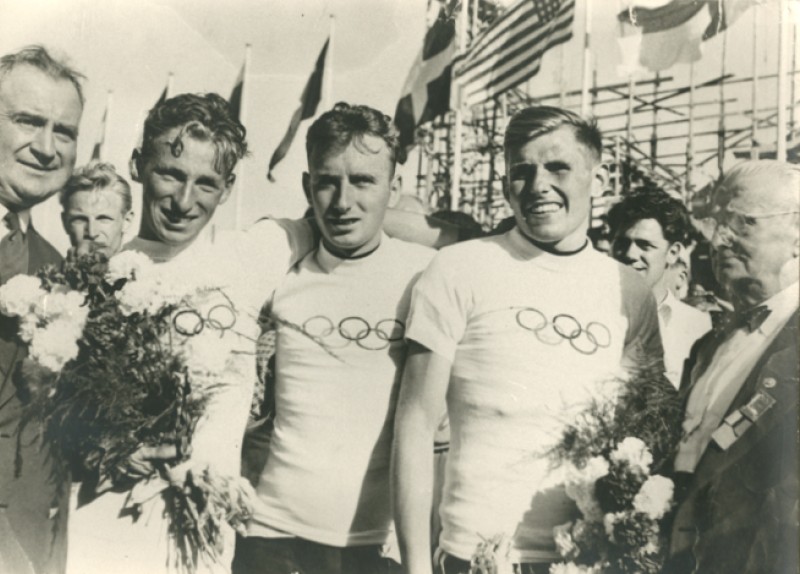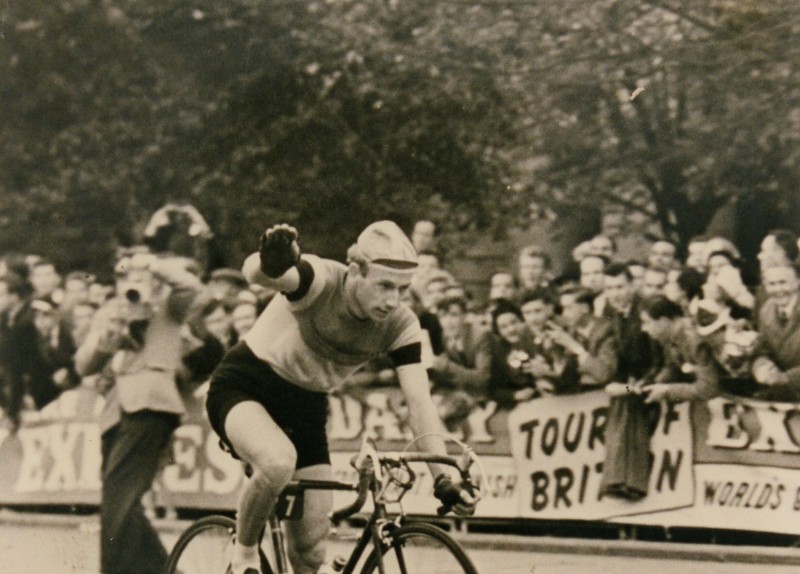A fierce fire on the Ypres velodrome in 1909 dealt a heavy blow to the local cycling scene. The cycling track was only officially opened in January of that year when less than three months later, during the Tour of Belgium, a fire caused serious damage to the grandstand and the track. Two years later, the track was already closed. The brothers Arthur & Léon Vanderstuyft make up the Ypres cycling pride at that time. They have been the Ypres rocks in the cycling fire up until then. Arthur was born in Essen - his father Fritz worked in Antwerp for a while - and became Belgian road-racing champion in 1903 but was particularly successful as a stayer on the track. Like his brother Léon, he won several medals at world championships.
Ypres Belgian André Noyelle easily won the youth series and was the best in the Kattekoers in 1951.
More than four decades later, a rider comes to the fore who seems to be able to compete with the Vanderstuyft brothers. Ypres resident André Noyelle easily wins the youth series and in 1951 he is the best in front of his own people in the Kattekoers. Noyelle is only in his third season as a cyclist and the town is dreaming of a successor for the Vanderstuyft brothers.
Despite his military service, Noyelle starts the 1952 cycling season with a series of victories. André is a paratrooper on the airbase of Koksijde, but gets the necessary facilities thanks to a sports-minded military entourage. In the Tour of Belgium for amateurs that year, he won a time trial and a stage in line. Noyelle's good performance and form curve did not go unnoticed by the selection men of the cycling federation. On the contrary, he is selected for the Olympic road race in Helsinki together with Robert Grondelaers from Opglabbeken, Rik Van Looy from Grobbendonk and Lucien Victor from Roesel. Cycling club KSV Deerlijk, which has both Victor and Noyelle in its ranks, actually made up half of the Belgian selection!
Without any group training beforehand, the Belgian team leaves for the Finnish capital in July 1952. In Helsinki itself, the Olympic Games seem to be heading for a national disaster for the Belgians. Only in rowing did the men's team manage to win a (bronze) medal. The road race on the last day of the Games is the ultimate chance for additional medals. In the race the Belgians are soon reduced to three after a crash by Van Looy. The remaining trio doesn't seem to be bothered by the man-minus situation and race with an open mind. Grondelaers, Noyelle and Victor and the German Ziegler jump away from the peloton and fight for the victory. The Belgian teammates take turns to control the German in the final and complete the team game successfully. André Noyelle takes gold, Robert Grondelaers silver. Ziegler beats Lucien Victor to third place and takes bronze. Belgium also finishes first in the team ranking and thus takes four additional gold medals.
The euphoria on the home front is overwhelming. Especially André Noyelle, who was rewarded with two gold medals and two Olympic jerseys, was showered with praise. Noëlla Vandamme, André's wife: "After returning to Belgium, we headed for Koksijde for the first homage at André's military base. Together with his superior he then travelled to Brussels, where a meeting with the national army chiefs was on the agenda, followed by a reception at the Royal Palace. Prince Regent Karel shook hands with him there. From Brussels it was back to Ypres - with a stop at Karel Van Wijnendaele's house to swap his costume for his Olympic jersey - where he was received at the town hall. André was surprised by his colleagues from the airbase in Koksijde who flew over and briefly wiggled their wings. He was very touched by that."
André himself remains sober in the face of all the honours and accolades. Already on the plane home he let slip that he would like to exchange the Olympic title for a victory in a world championship. Only years later did he really realise what he had won. In 1952, he also became world champion. At the World Championships in Luxembourg, he just had to give way to the Italian Ciancola and the Dutchman Van Berkel and finished third. The Dutchman is then disqualified because of an irregular bike change. André's impressive performance results in an early professional contract in 1953.
Together with Rik Van Looy, it goes from the amateur category straight to the highest class of cycling. And the very young neoprofs enter through the big gate. After Van Looy, Noyelle wins a race almost immediately. Van Looy is the best in Kortenaken, Noyelle wins the annual Grand Prix of the Nieuwmarkt friends in Roeselare. After that, it gets harder for André to win. In the following years, he takes part in local races, but no real big victories. Noëlla Vandamme sees an explanation for the lack of top successes with the pros: "André was too good to be a racing cyclist. His quick successes made a number of established names jalous. Moreover, we started a café in 1957 and that is actually not so good for a racing driver. Especially in the weekend when people stayed up late. André slept in the café and he wasn't a regular sleeper. He should perhaps have been like Gilbert 'Smetje' from Lichtervelde: keep the bar, but go and sleep elsewhere."
The newly married couple found a suitable location at the corner of Haiglaan and Poperingsesteenweg and very appropriately christened their establishment 'café Helsinki'.
In 1963, Noyelle starts a cycling season for the fifth time in the colours of the French bike brand Bertin. The season doesn't deliver the hoped-for results. A 7th place in Kuurne-Brussels-Kuurne is the best result. The 32-year old Noyelle is thinking about retiring from cycling and three years later he finally hangs up his bike. The Roeselare bicycle wholesaler Alidore Declerck - importer of the Northern French bicycle brand Bertin and supplier for the Bertin cyclists in the region - convinces André to start a bicycle business.
About 100 metres from the Helsinki café, Noyelle starts his own bicycle shop under the name 'Noyelle Sport'. Young cyclists from the region soon drop by to buy a bike and get advice on racing. One of them - the talented Noël Vantyghem - wants to learn the trade of bicycle mechanic as well as racing and almost moves in with Noëlla & André. André is happy to pass on his knowledge of the trade - which he himself acquired from former Ypres rider and mechanic of the Belgian Tour team Georges Vanhove - to the young Noël. Officially, André will never become a team manager, but the fact that he is an excellent trainer with plenty of race experience is a bonus for the young Vantyghem. Even when Vantyghem makes the move to the pros, André will remain his mentor and support for a while.
As a bicycle mechanic, Noyelle remains a welcome figure in Ypres. He is enormously proud of his town: "André was always in awe of Ypres. Especially the passage under the Menin Gate gave him goose bumps almost every time," says wife Noëlla. He is guest of honour during the annual Kattekoers - a renowned race for fans that ends in Ypres. In 1983, the race was preceded for the first time by an inter-club for juniors, to complete the Ypres cycling grand prix. Thirteen years later, the organisation thinks the time is ripe to rename this 'waiting race' the 'André Noyelle Grand Prix'.
The city of Ypres is also mindful of its cycling heroes. After a 'velodrome street' and a 'Vanderstuyft street' - referring to those other reference points in the city's cycling history - the street names register was expanded in the summer of 2014 with a cycling path named after the Olympic champion. And at André and Noëlla's house, the five Olympic rings on the façade provide an additional permanent reminder in the street scene.
Flanders is race and race is Flanders. Fortunately Ypres is also a lot of racing and a lot of riders. One of those Ypres riders is definitely...
Leicester, August 1970. The 21-year-old from Roeselare, Jean-Pierre Monseré, outsmarts his opponents at the world cycling championships and becomes...
The 1952 Summer Olympics in the Finnish capital Helsinki - held from Saturday 19 July to Sunday 3 August - threatened to turn into a sporting...


